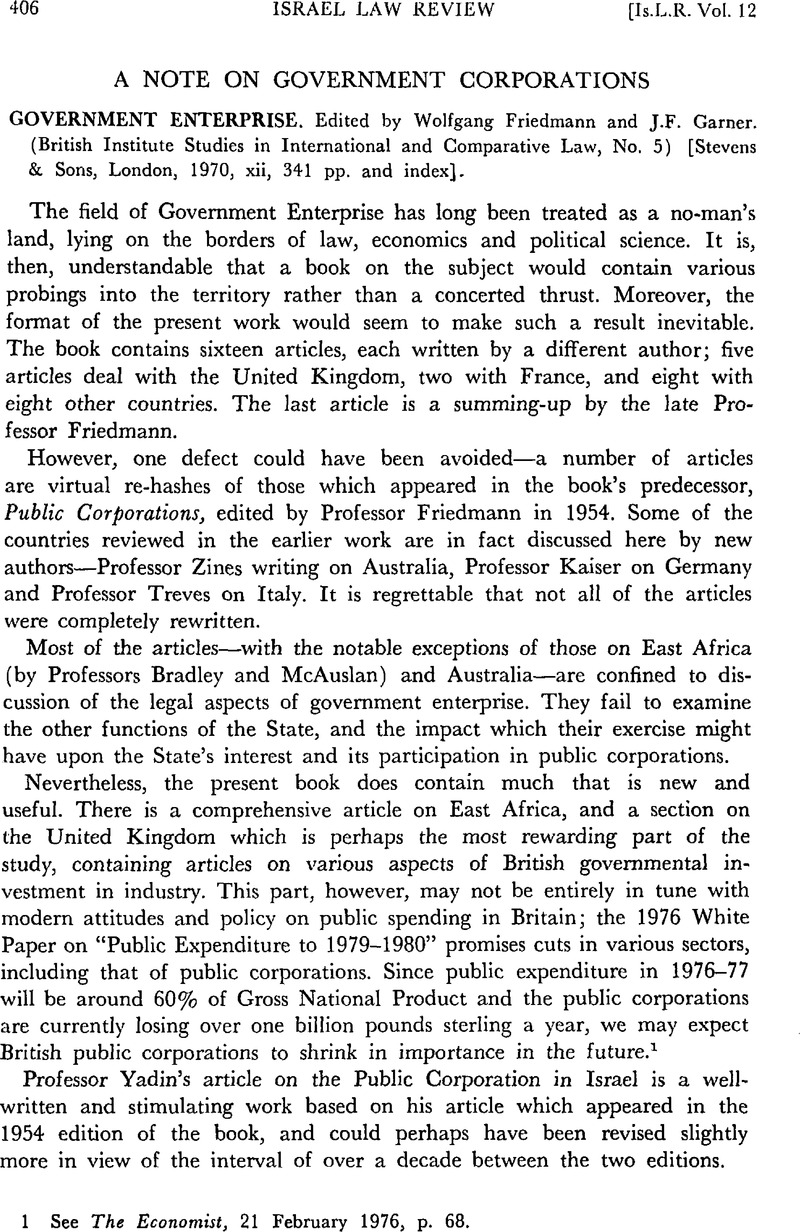No CrossRef data available.
Article contents
A Note on Government Corporations - Government Enterprise. Edited by Wolfgang Friedmann and J.F. Garner. (British Institute Studies in International and Comparative Law, No. 5) [Stevens & Sons, London, 1970, xii, 341 pp. and index].
Published online by Cambridge University Press: 12 February 2016
Abstract

- Type
- Books
- Information
- Copyright
- Copyright © Cambridge University Press and The Faculty of Law, The Hebrew University of Jerusalem 1977
References
1 See The Economist, 21 February 1976, p. 68.
2 E.g., there is an express authority in case law that the Land Administration is not independent—i.e., could be viewed as part of the State (discussed by Yadin, p. 254, n. 23) in Abd Allah Baloum v. Land Administration (1966) (I) 21 P.D. 109, and that the Railways Administration is equally not inde pendent (see p. 255), in Moshe Levi v. Director General of Railways Ad ministration. See also case law relating to the Administrator General and the various Custodians of Enemy Property, Absentees Property, and of Ger mans' Property (discussed by Yadin on p. 255)—e.g. Kalin v. A.G. (1952) 5 P.M. 258; Re Levin Feingold v. A.G. (1949) 5 P.D. 1180; A.G. v. Peham Ltd. (&Iacgr;952) 8 P.M. 250; A.G. v. Reich (1949) 2 P.M. 56.
3 The Government Companies Law, 1975, S.H. no. 5735, p. 132, s. 1(a).
4 See ProfessorGross, Y., “The Government Company” (1976) 31 HaPraklit, 493Google Scholar; ProfessorLevy, Augusto, “The New Draft for Government Companies” (1973) 28 HaPraklit 428Google Scholar; Ashkenazi, Hillel, “The Government Companies Act: Unripe Fruit” Ha'aretz 24 January 1975.Google Scholar
5 Which has now been given separate legal personality in the Council for Higher Education Law (Amendment No. 4) 1975, S.H. no. 781, p. 243.
6 Sec. 42 states that “Save as otherwise may be expressly provided, no enactment shall affect any right of or impose any obligation upon the State”.
7 On this test see Friedmann, , Law and Social Change in Contemporary Britain (London, Stevens, 1951) 210–212.Google Scholar
8 (1957) 11 P.D. 659, 664.
9 (1959) 13 P.D. 722.
10 Id., p. 727.
11 (1959) 13 P.D. 722. See also Mizrachi, M., “The State Privilege under Section 42 of the Interpretation Ordinance” (1974) 5 Mishpatim 135 and 383 at 393.Google Scholar
12 Report of the Committee for the Preparation of a Government Corporations Bill (Chairman: Prof. A. Barak) (Institute for Legislative Research and Comparative Law, Hebrew University of Jerusalem, Faculty of Law, 1970) 25. Prof. Yadin served on the Committee.
13 Ibid., sec. 3 and pp. 46–47.
14 Which provides that “subject to the instructions of this Law, the Companies Ordinance shall apply to Government Companies”. This provision was also included in the proposed Government Corporation Law, (1973) H.H. no. 1067, p. 317, sec. 2.
15 See Sharabat v. The Society for the Aged (1972) (I) 27 P.D. 621 at 626–7; Simer Construction Company Ltd. v. Development Minister and the Electricity Company (1974) (II) 29 P.D. 234 at 236.
16 (1962) 16 P.D. 2101.
17 Ibid., at 2105.
18 (1975) (1) 30 P.D. 413, 415, where Berinson J., said “…even a private individual must act in the accepted fashion and in good faith in the negotiations leading to the making of a contract. A public body such as the respondent no less so, even when it performs a business transaction as a property owner. Every business transaction of the Administrator also has a public aspect, which requires him to act in an equitable fashion, fairly and in good faith”.
19 See Barak Committee reports, supra n. 12 at 48–9.
20 See Tamlin v. Hannaford, [1950] K.B. 18, 23.
21 See Ramat v. Jewish Quarter Development Co. (1971) (1) 26 P.D. 118, 121 where Berinson J. decided that building and developing the Jewish Quarter is “a clear public function”; Pudim v. The Institutions of Higher Education (1973) (I) 28 P.D. 354, where it was held that the Institutions of Higher Education were public bodies; and Sharabat v. Society for the Aged (1972) (1) 27 P.D. 627–8, where Berinson J. again applied the test.
22 See Ramat, supra 21, at 121–122, where Berinson J. points out that most of the shares are held by the Government which thus elects the Board of Directors, that almost all the Directors are Government members, that the company's finances are paid by the Government, and he sees in these facts a factor in favour of subjecting the Jewish Quarter Development Co. to public law. See also Sharabat, supra n. 21 at 628, where Berinson J., decided that the Society for the Aged is not controlled by local authorities, since they do not supervise the management of old age homes and finance only 18% of its budget. Also cf. Tamlin v. Hannaford, supra n. 20, at 23.
23 See Ramat, supra n. 21 at 127, where Kahan J., discusses the advantages of this test over the functional test—the functional test, he says, would apply to bodies independent of the executive such as the Jewish Agency, Kupat Holim, Public Transport Authorities, etc. over which the Government does not have control.
24 See Sharabat, supra n. 21, and Simer, supra n. 15.


